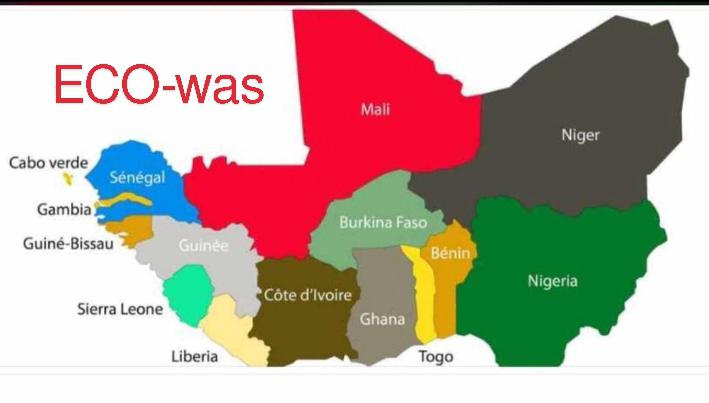In what diplomatic watchers described as a stark rebuke, Russian President Vladimir Putin has issued a direct warning to the Economic Community of West African States (ECOWAS), singling out Nigerian President Bola Tinubu for alleged attempts to destabilize the newly formed Alliance of Sahel States (AES), comprising Mali, Niger, and Burkina Faso, according to multiple diplomatic sources, who have been briefed on a confidential cable that the Kremlin reportedly sent out to all Russian diplomatic missions last week.
A Russian embassy official in Washington DC who answered the phone told Huhuonline.com that he was not competent to comment on internal memos from the Kremlin, before passing the call to another official who refused to identify himself, asserting that he has not been authorized to respond to media inquiries about specific issues incidental to Russian foreign policy in Africa. But he was very defensive of what some diplomats have described as “Russia’s recent diplomatic charm offensive in Africa” and was quick to retort that Russia issued the direct warning to ECOWAS because President Tinubu’s “actions and reckless ambitions have become a clear and present threat to the fragile peace emerging in the Sahel corridor. What we are witnessing is not regional leadership, but imperial arrogance, draped in the shredded banners of ECOWAS. Under Tinubu’s direction, ECOWAS has become less a coalition of sovereign nations and more a willing pawn for foreign interests seeking to recolonize the African continent under new pretenses.”
Another official who rejected multiple requests by Huhuonline.com to identify himself, insisted that he was not speaking on behalf of the Russian government, but went ahead to say this in an email response to Huhuonline.com: “Let me be clear: the governments of Niger, Mali, and Burkina Faso, have every right to determine their own future, free from Lagos-based puppeteering or Paris-funded coups disguised as democratic interventions. Moscow will not stand idle while nations that have chosen independence are punished for resisting neocolonial blackmail. If Tinubu believes he can bully these nations into submission with threats of military intervention or economic strangulation, he is sorely mistaken. Any further provocation by ECOWAS; any reckless military action, any economic siege, any covert destabilization, will be interpreted as a deliberate assault on their sovereignty. And the response, while proportionate, will be unambiguous. I strongly advise President Tinubu to redirect his energies towards fixing the collapsing infrastructure, spiraling insecurity, in his own backyard. The Sahel states have made their choice. Let no man, no bloc, no empire old or new, presume to overturn it.”
The warning to ECOWAS leaders came on the heels of a high-profile visit to Moscow by Burkina Faso’s President, Ibrahim Traoré, under Russian fighter jets escort. In a diplomatic spectacle heavy with symbolism and strategic messaging, as his presidential aircraft entered Russian airspace, it was flanked by a squadron of Russian fighter jets – a powerful gesture by the Kremlin that served not just as a warm welcome, but a bold statement of alliance and protection. President Traoré, just 36 years old, has become an emblem of anti-imperial resistance in francophone Africa, and his visit was anything but ordinary. The military escort was widely interpreted as a nose-thumbing at France, Burkina Faso’s former colonial ruler, and the United States, both of whom have lost significant ground in the Sahel to Moscow’s expanding influence.
During his Moscow visit, Traoré met with top Russian officials, including Foreign Minister Sergey Lavrov, to deepen security and economic ties. The discussions reportedly included enhanced military cooperation, arms procurement, and the training of Burkinabè forces – all components of the new Sahel security architecture being shaped under the Russian sphere of influence. Also on the table were Russian investments in mining, infrastructure, and nuclear energy for civil use – sectors in which France and the West once held dominant influence. Additionally, Russia is expanding its influence in the region through economic initiatives. Rosatom, Russia’s state nuclear corporation, has signed memorandums of understanding with Burkina Faso and Mali to develop nuclear energy infrastructure, aiming to address the region’s energy deficits.
This was not merely a diplomatic trip; it was a carefully choreographed geopolitical message. Traoré’s military-escorted arrival signaled a shift in allegiance and an assertion of sovereignty, especially after Burkina Faso expelled French troops and shut down Western media operations in 2023–2024. Russia, through the creation of its Department for Partnership with Africa and plans for a permanent mission to the Alliance of Sahel States (AES), is clearly betting on Traoré and his AES counterparts to anchor a new anti-Western bloc in West Africa. The fighter jet escort underscored this pivot and demonstrated Moscow’s willingness to project power in the region. In essence, Traoré’s Moscow visit was less a diplomatic courtesy call and more a declaration: the Sahel is no longer France’s backyard.
This latest Russian warning follows a series of diplomatic engagements between Russia and the AES. In early April, Russian Foreign Minister Sergey Lavrov hosted top diplomats from Mali, Burkina Faso, and Niger in Moscow to discuss strengthening military cooperation. Russia pledged support for the AES’s planned 5,000-strong joint force aimed at combating jihadist insurgencies in the central Sahel. Moscow is currently studying the feasibility of several ambitious projects in the Sahel, notably in the civil nuclear sector in Mali and Burkina Faso.
The AES was established in July 2024 as a confederation formed between Mali, Niger, and Burkina Faso. The alliance originated as a mutual defense pact created in response to ECOWAS’s threats to intervene militarily to restore civilian rule after a coup in Niger earlier that year. Neither President Tinubu nor any ECOWAS leader has publicly responded to Putin’s edict. However, ECOWAS has previously expressed concerns over the increasing presence of Russian military personnel and private contractors in the Sahel region, viewing it as a challenge to regional stability. As tensions escalate, the international community watches closely, concerned about the potential for increased conflict and the broader implications for regional security and geopolitical alignments in West Africa.





